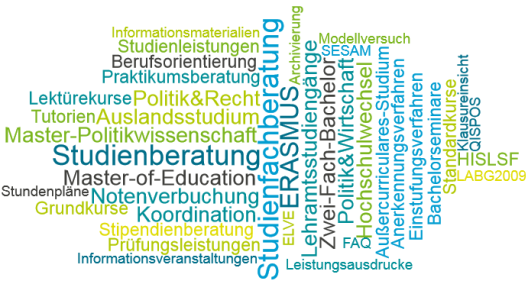Structure of the study program

Here you will find useful information about the organization of your studies at the Institute of Political Science at the University of Münster.
If you have any questions, please do not hesitate to contact the SIC.

Here you will find useful information about the organization of your studies at the Institute of Political Science at the University of Münster.
If you have any questions, please do not hesitate to contact the SIC.
Political Science comprises the following core areas:
According to an international professional consensus, subjects in all these areas can be divided into policy content (policy), the political processes of conflict resolution and the planning and implementation of goals (politics) and the organizational and procedural structures, including the institutions, in short the political order (polity).
At the beginning of the degree course, the focus is on gaining an overview of the subject and acquiring fundamental knowledge through the basic courses and accompanying tutorials. In addition to primarily subject-specific knowledge, methodological knowledge of the techniques of academic work should also be acquired in the first stage of the course.
In the further course of study, the options available increase. It is therefore possible to set clear priorities and develop your own qualification profile through the chosen courses, further internships and the final thesis.
A stay abroad can also help you to orientate yourself and specialize further. In addition, stays abroad are often fundamental for training and a prerequisite for some Master's degree courses or jobs. For information on opportunities abroad, please contact the Erasmus and International Affairs staff at IfPol or the International Office at Münster University.
You can find a glossary with the most important key words you will encounter at IfPol here.
A timeline with the most important dates such as the start of lectures, registration phase or re-registration phase
can be found here.
The requirements for graduation can be found in the respective examination regulations. However, at the end of every degree course is the final thesis.
Here you will find useful tips and tricks for writing [bachelor's] theses in the field of political science.
In addition, some former fellow students have made their theses available for viewing. You can find them here.
After completing your studies, many fields of activity are open to you. You can find some of them here.
| Key qualifications | Flexibility | Additional qualifications |
| Professional competence | Adaptability to new requirements and challenges | Interdisciplinary skills |
|
Methodological competence a) Ability to deal with political science and interdisciplinary knowledge in a problem-oriented manner b) Sound knowledge of political science solution strategies, the ability to think analytically and synthetically and the ability to apply knowledge in a goal-oriented manner |
Flexibility in the perception and management of (professional) situations |
a) Basic knowledge in areas such as economics, law, sociology or history b) Sound knowledge of at least two foreign languages. c) Sound IT and web skills |